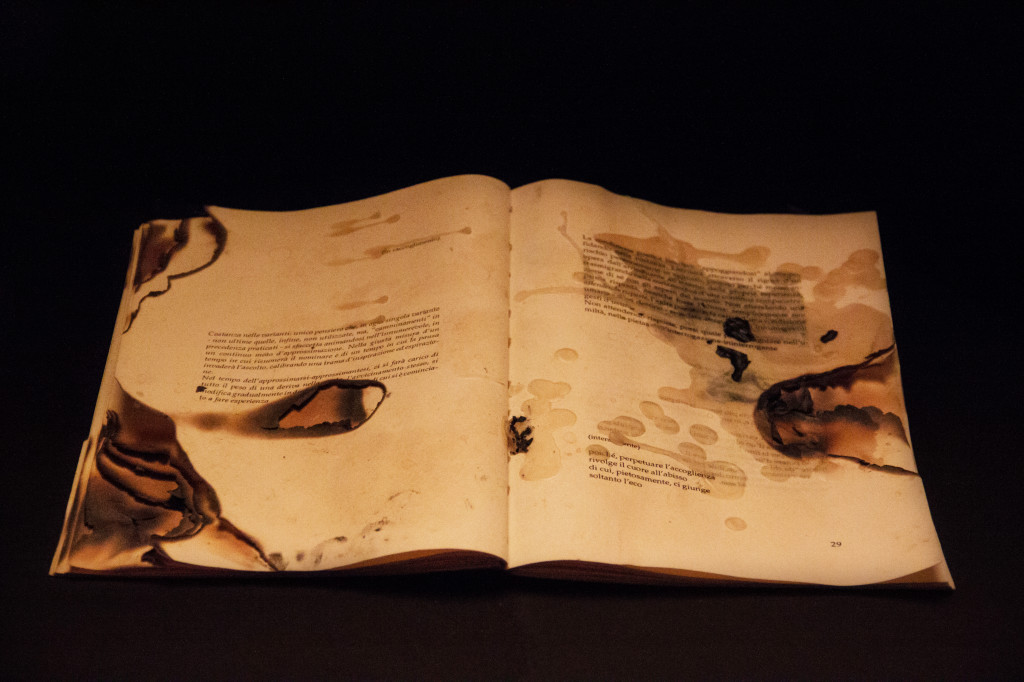
Gianfranco Pernaiachi – Seven Poems n.1
On the occasion of VISITAZIONI, International Festival of Sonorous Installations (Rome),
the composer and poet Gianfranco Pernaiachi
presents from Sunday, February 16 to Wednesday, February 19, 2014 his last work that he defined a “meditation room”.
(free entrance from 7pm to 11pm, at teatroinscatola, Lungotevere degli Artigiani 12/14. Full program).
It’s the first effort of the composer in the visual arts: we find ourselves into “a “private” place that the viewer lonely, in a unique form of contact and dialogue with the author and the work of art, is called to visit. A work that is sound in its essence, but it looks from the point of view of memory, of suggestion, of the recognition of that inner voice that all of us possess and that the author, through his vision, wants us to listen” (from the Proposte Sonore website, Festival Visitazioni).
On the opening to the public of his installation, the composer will present a boxset that blends together two works he undertook in different times which ‘dialogue’ together: “Ora” (1997/2001) and “Visitazioni” (2011/2013).
“Ora” is a two hours single flux of sounds and silences. It can be rearranged according to the listener’s perception. Its parts – as well as the graphical notation itself – serve this purpose only. It is strongly recommended a low volume listening through headphones.
“Visitazioni”, inspired by similar principles but opened to a variety of possibilities, is a series of ‘invitations’ to meditation where perceptions, intuitions and visions are nicely put together. We look at (‘charts’ that suggest a past life must be rearranged for a private itinerary) … we listen … we read and the diverse feelings reverberate one into another.
As an echo to it, seven ‘burned’ books (“Seven Poems”) answer and act like a counterpoint for the visual and sonorous materials enclosed in the boxset.
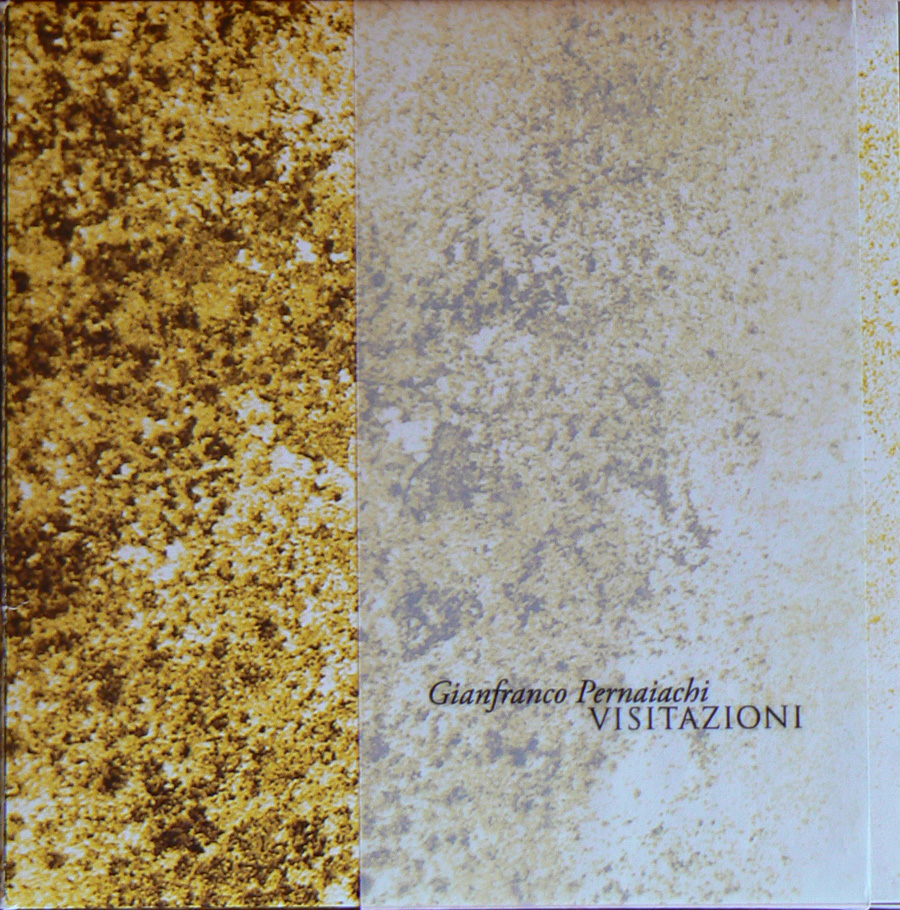
Cover of the Visitazioni boxset
The boxset “Visitazioni” (2011/2013) is a lavish set (cm 14x14x2) containing 13 charts with various images, a video DVD, two audio CDs. Its content changes in each box, so that they are all unique sets. Every box is numbered.
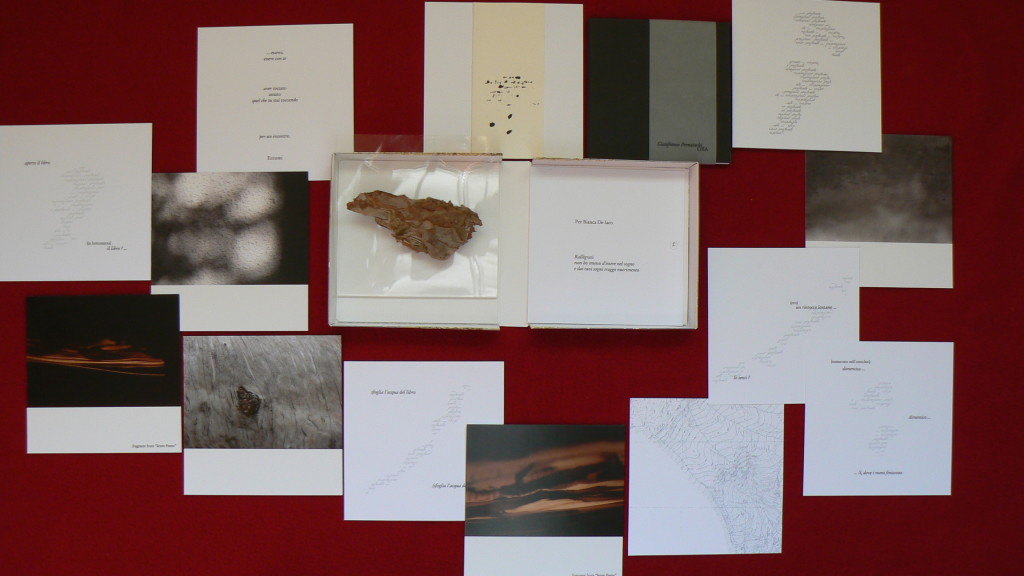
Content of one of the Visitazioni boxsets
“Seven poems” (2011/12) is a series of seven copies of the same book (“Nel riverbero del nome”, written by the author and published in 1994) that became ‘sculptures’ by means of a preliminary combustion and a subsequent ‘revisitation’ of each copy. Seven unique copies presented through different techniques: water, oil, wax… (see the images).
Each single book is placed inside a plexiglass case mounted on a stand made of the same material (cm 35x26x3,5).
The books are numbered and autographed by the author.
For more informations, please contact the Proposte Sonore website.
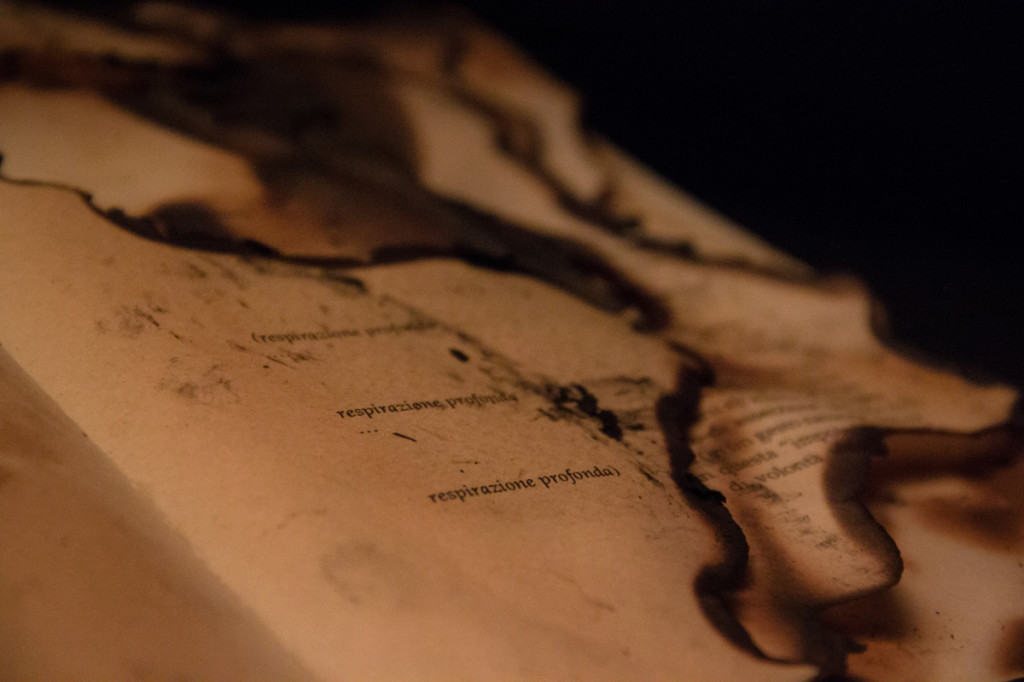
Detail from Seven Poems n. 2
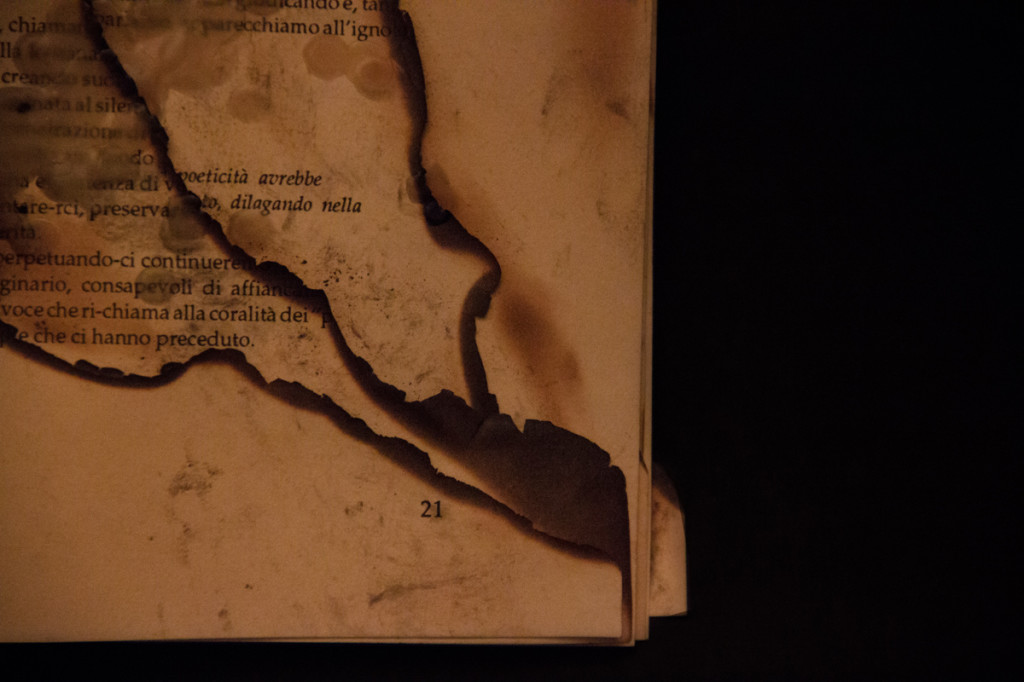
Gianfranco Pernaiachi’s work follows his enduring meditation upon silence and the tension that precedes the making of the artwork itself. His output – marked by the rarifying of elements (either they are sounds: “Sillabe D’Ombra”, “Abendland”, “Ora”, or words: “Nel riverbero del nome” – two undistinguished entities for the composer) – testifies this deep and suffered reflection.
Even the cadence of the new publications has progressively slowed down – and “Visitazioni is its most complete evidence – facilitating the rewriting of the materials accumulated over the last 20 years and featuring a restless thrust to investigate, circumnavigate, perhaps re-interpret what was stated in the past. On this note, Pernaiachi’s work pushes to the extremes Gerard Genette’s theory: “[…] each draft represents a (subsequent) hypertext of the previous version and a (preceding) hypotext of the upcoming one and since the very beginning up to the latest edit, the birth of a text is a matter of self-hypertextuality.” (from Palinsesti, Einaudi, 1997).
Inside the multimedia work “Visitazioni”, the “Seven poems” can be considered the paradigm of the reflection on the project. The combustive aleatoric (though guided) process must be connected to the emission of sounds, also biologically aleatoric due to the propagation in the space and its reception by the bodies. The aim is to create a work where the subtraction adds new meanings that vary for each fruitor of the “meditation room”. This way Pernaiachi, albeit manifest architect of the operation, tries to sift his materials from the assertive presence of the narrator, clearing words and sounds and reaching the architext from which the experience of the other begins. It must not be forgotten the religious meaning (holy in thePernaiachi’s case) of the word “visitazione” (visitation), which indicates how the path of viewing must be undertaken: humbly and also inwardly when the act of visiting is biunivocal: the work ‘visits’ the fruitor as he visits the work. There is a tension, a performative aspect of this room that is the real novelty in the author’s research.
If the encounter concretizes into an announcement, then Pernaiachi would be right.
Biography (from the Proposte Sonore website)
From 1966 to 1973 he studied double bass, flute and composition, in part at the Conservatory of Santa Cecilia in Rome, partly privately, and then leave the school environment to further his studies in the fields of other artistic expressions.rom 1970 he started to compose presenting choral, chamber and symphonic works at different institutions, both in Italy, Europe, Middle east, Africa and the Americas, as well as in the Soviet Union.
Among the musical works: Aforismi for piano (Rugginenti, 1970); … di alcune figure for orchestra (1971/72); Aeon for chamber orchestra (Sonzogno, 1980), Nel tempo e nella ragione for orchestra (Sonzogno, 1982); Realgar I / II for trombone and tape (Edi-Pan / BMG, 1980/84).
Since 1987, in the extreme distillation of writing and composing, more and more convinced of inadequacy of the the usual concert channels, he preferred to entrust the spread only to the middle of recordings.
With Terre Rare (Rare Earths) (project started in 2003 and still in progress), he began a series of “unlimited” projects (work in progress) in which the author himself – through real encounters or direct talks – individually enter in contact with the user-partner of his work.
Recordings to his credit on behalf of: Bess, Pentaphon, Rusty Records, Edi-Pan, Dynamic, Amiata Media, Audiovisual St. Paul, BMG, Ants.
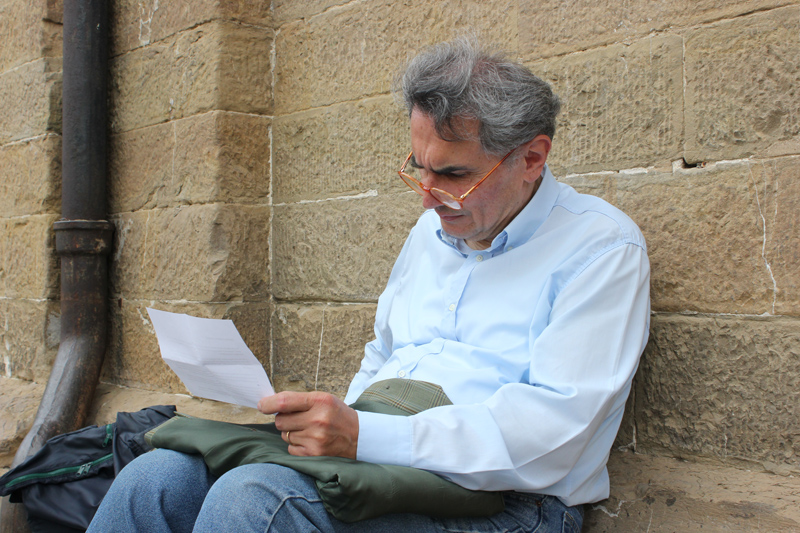
Alongside the musical experience, from his early youth, he devoted himself to the composition of poetry. He has published the books: Da un’altra infanzia (Ed. del Leone, 1987), Encanto (Amadeus, 1991), Nel riverbero del nome (Tracce, 1993), L’oro della sera (Allemandi , 1999).
In its path, artistic and existential experience are increasingly inextricably linked. For this reason, feeling his beliefs are incompatible with the teaching as well as organized in the school, survey voluntarily resigned from the Conservatory of Music “L. D’Annunzio” of Pescara, in which he held the chair of Harmony and Counterpoint – becoming its owner – 1978-1987.After that date he preferred to decline any invitation on courses or seminars that would provide for a “normal” educational excursion.
After having voted entirely to “do”, to produce works in the musical and poetic, in recent years goes by probing the possibility of building a purely interior work.
He cultivates the silence.

Lascia un commento